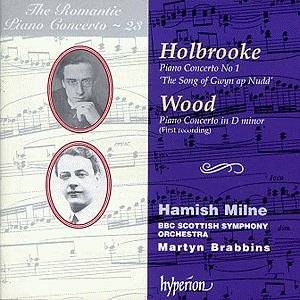A sense of drama opens Holbrooke’s concerto – is it perhaps an operatic prelude? The rather Lisztian cadenza leaves no doubt that it’s a virtuoso piano concerto. To our ears there is a sense of caricature that suggests a Hollywood bio-pic built around a pianist-hero of the day.
Although in the conventional concerto-form of three movements, there are no less than 22 tracks – for a piece lasting 36 minutes. If the music sounds anachronistic, it’s good that it is revised. This is its first professional performance in forty years. Like a lot of Holbrooke’s music, the concerto is literary-based. In fact the programme note for the first performance of the concerto called it a symphonic poem. The Welsh legend at the heart of the music is courtesy of Lord Howard de Walden (more impressive than T.E. Ellis) – ‘The Song of Gwyn ap Nudd’ is reproduced in full in the booklet with track numbers helpfully ascribed.
The music itself is, well, attractive in a Romantic sort of way and intriguingly diverse in a descriptive sort of way. Track 11 (we’re in the slow movement now) is a rather pretty waltz, a little bit like Eric Coates – "Clotted of shadows he comes to my hest / A fiery-eyed phantom. The dream lists are dressed / And peopled of spectres. There’s this for my zest / I have sucked you from sleep and have ripped you from rest / Come ye and share in my pain." As Victor Meldrew said, often: I don’t believe it! Certainly not in relation to the music!
Melodramatic in the stormy music, rather insouciant in the more lyrical stuff, Holbrooke’s concerto is no great shakes; a bit of a dinosaur, but he was obviously an able composer who could write a no-holds-barred piece. What it lacks in distinction it makes up for in vivid narrative and corny gestures. It just needs a film to go with it. A period piece of gaslight Victoriana played here with tremendous assurance and commitment.
Wood’s concerto is also in three movements (and three tracks). I wasn’t expecting the rather portentous opening, but then I only know his rather fun (quaint) Horse Guards – Whitehall (the signature tune for "Down Your Way", last heard on Radio 4 about twenty years ago I guess). I feel old – my dad’s got Wood’s march on a 78! It’s another world - one that has long disappeared. Mr Wood wrote Roses of Picardy and during the First War his concert ambitions turned to musical comedy and so-called light music.
The concerto has some nice ideas, not least a sweet one that surfaces in the first movement. The scoring is decorous, the interplay between soloist and orchestra imaginative. The problem is that there’s too much padding, a somewhat stilted sense of direction that meanders within traditional form. It’s all very pleasant though. The short (6-minute) central ‘Andante’ is a pleasing miniature, rather dreamy and contemplative. The ‘Finale’, like the opening movement, is rather ambitious for its material. The wonderfully over-the-top close, with cymbal clashes and a thunderous timpani roll, wouldn’t be out of place as the credits roll at the end of a ‘B’ movie – one of the frontier-dispute-now-reconciled or love-conquers-all type. This certainly raises a smile.
Both works are for a sweet tooth, for the listener who can separate musical content from ambitious structures. No doubts about the superb performances or sound quality, and if the music itself is variable and easy to deride, it is also curiously likeable.
Colin Anderson
See also review by Ian Lace.
Hyperion Romantic Piano Concerto series


